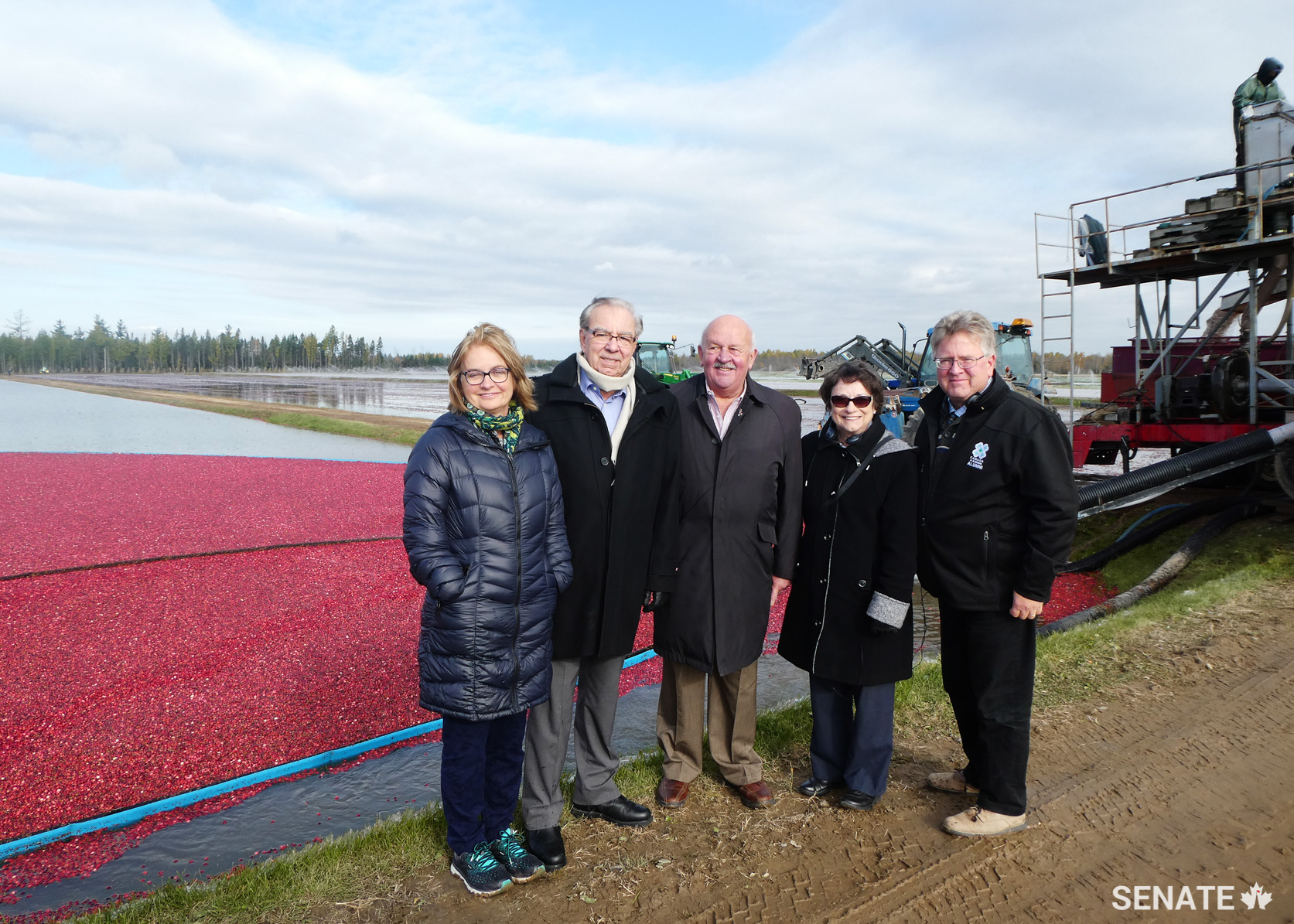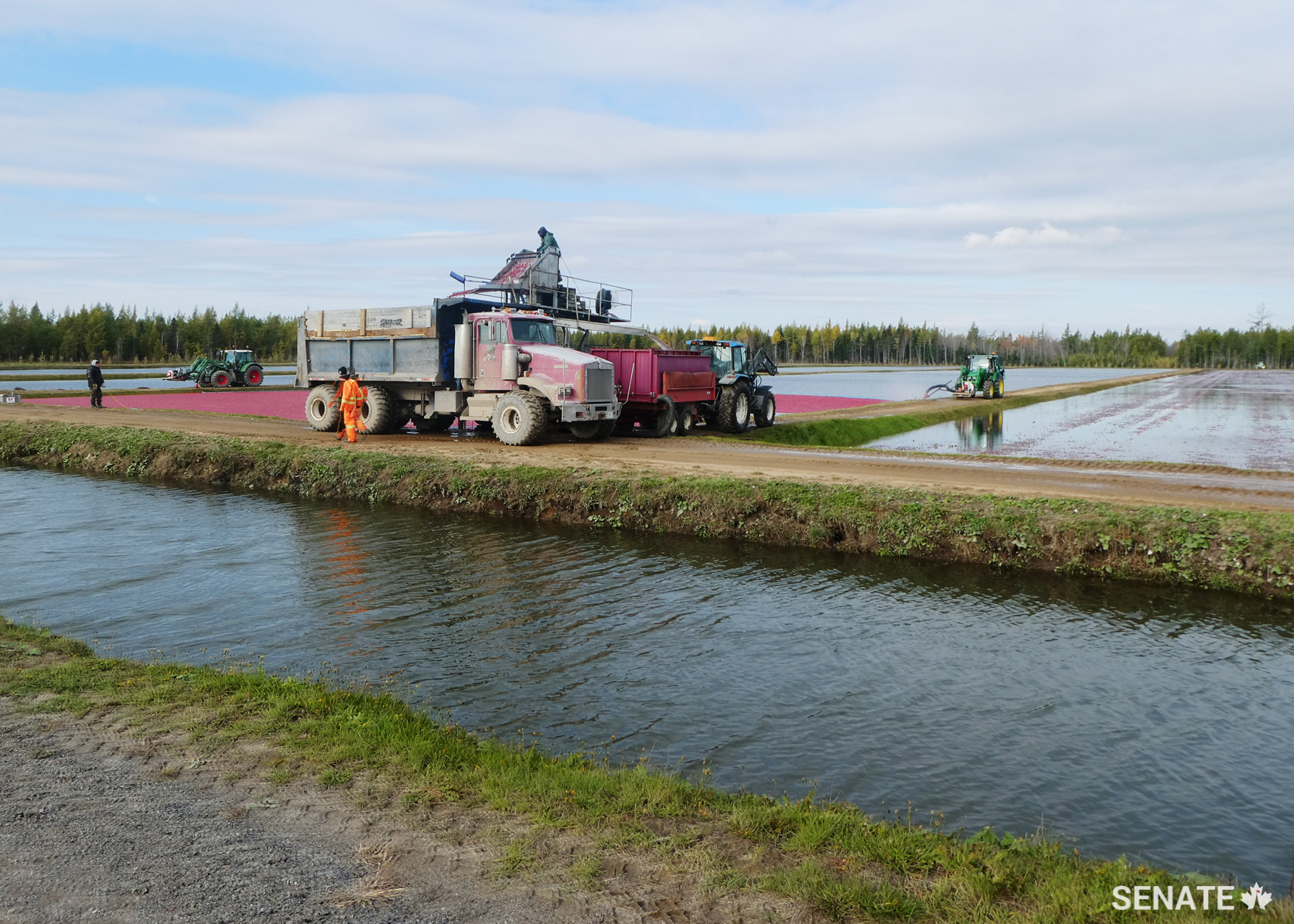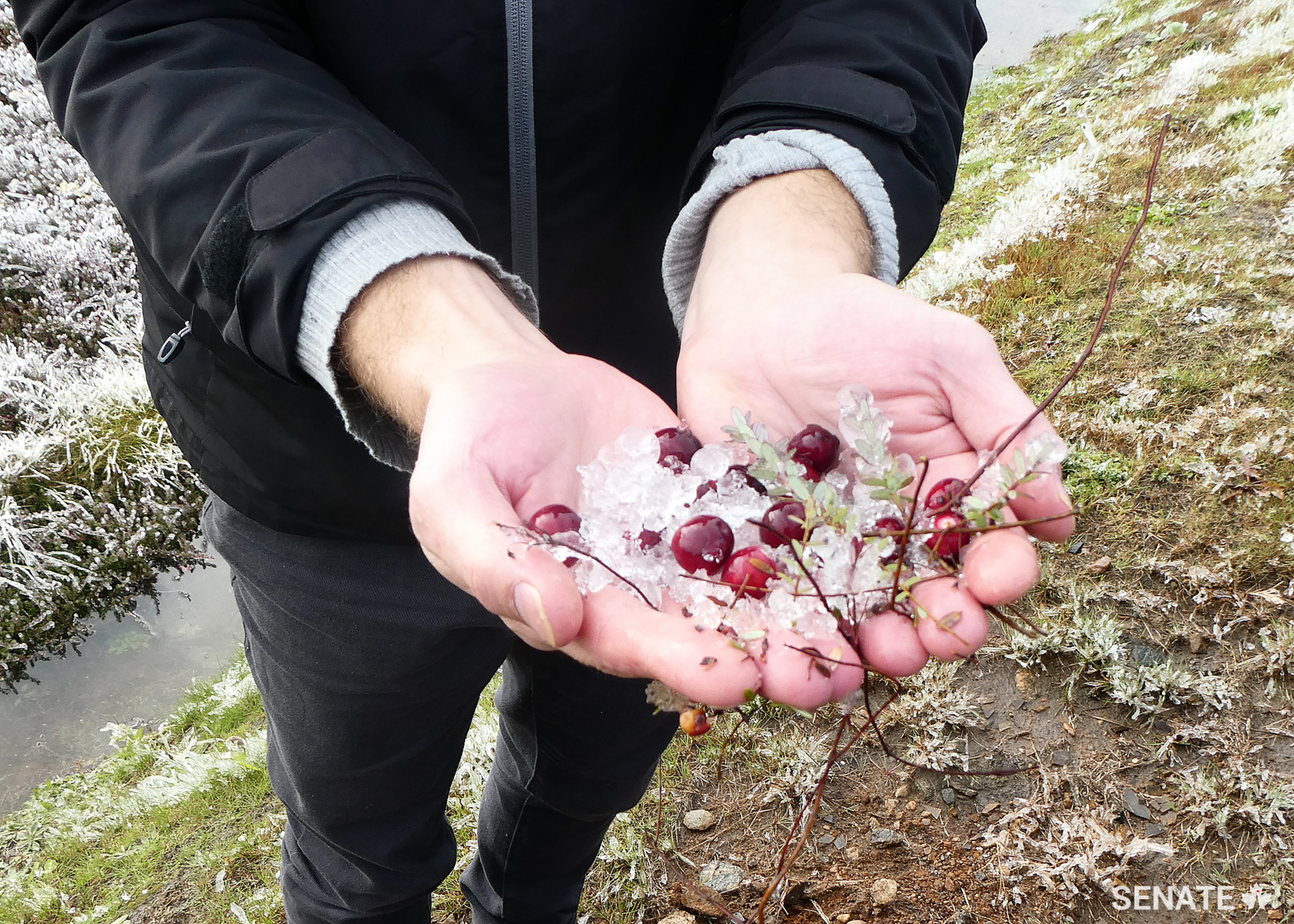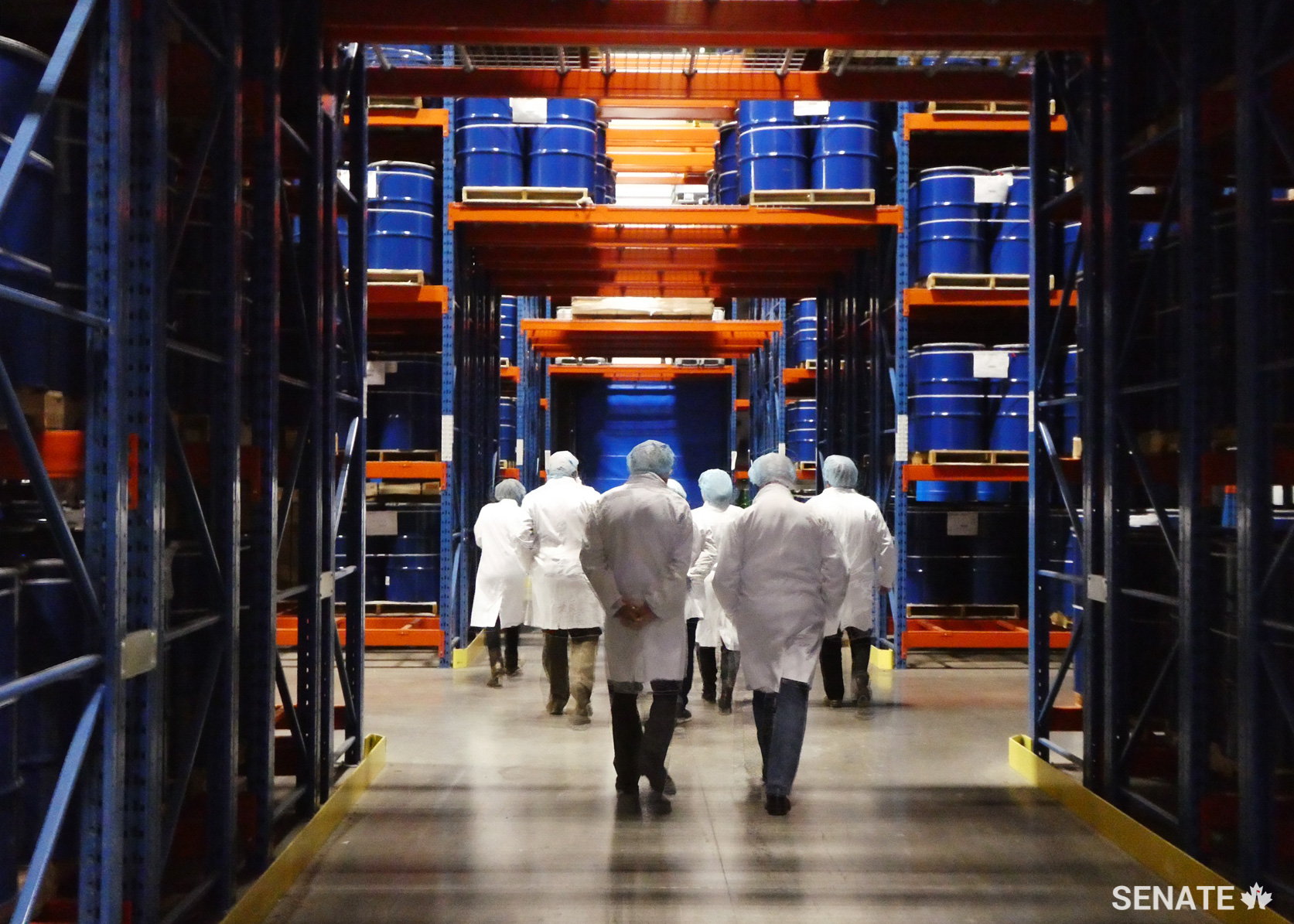Maple syrup, cranberries and some small towns’ big impact on Canada’s global competitiveness



Maple syrup and cranberries make a great combination – both on the table and when serving up a vital economy for Canada in general, but particularly for some small Quebec towns.
The Senate Committee on Agriculture and Forestry visited the farms, fields and factories of Laurierville and Plessisville, Quebec in October 2018 as part of its study into the value-added food sector in Canada. Senators saw first-hand how growing and processing local ingredients create a strong and self-sustaining local industry in these picturesque communities. These value-added foods help define Canada’s reputation for quality produce around the world.
Canada is the world’s second-largest producer of cranberries. Quebec accounts for around two thirds of Canada’s cranberry production and Plessisville is the heartland of this lucrative industry.
Senators saw the scale of the industry as they pulled up to one of the largest cranberry fields in Canada— the site of the world’s biggest organic cranberry producer, Fruit d’Or. Vast expanses of bright red cranberries bobbed atop the bogs, fields alive with activity as workers waded through waters dense with fruits.
Rather than exporting the crops to be processed elsewhere, the town of Plessisville benefits directly from processing its cranberries right where they’re grown. Senators visited the town’s cranberry processing facility where over 2.5 million pounds of Quebec cranberries are processed every day. The facility employs more than 360 local workers.
Senators heard that cranberry processing isn’t just focused on the popular dried cranberries and juices; the processing plant also produces health supplements, powders and purees. An ongoing research collaboration between Fruit d’Or and the University of Laval is helping grow the industry, looking at innovative ways to maximize the antioxidant qualities of the fruit.
Plessisville isn’t merely a world leader in cranberry production — it also boasts production of Canada’s most distinctive export: maple syrup.
Senators visited the headquarters of the Citadalle cooperative in Plessisville. An important exporter of maple syrup worldwide, the cooperative represents around 2,000 members and employs 200 people locally.
It’s no surprise, then, that community, on both a local and global scale, was an important theme that emerged when senators met with members of the cooperative. This small part of Quebec has an outsized impact on Canada’s agricultural and value-added sectors, and members of the Citadelle cooperative, which exports 90% of its maple syrup, are keenly aware of this privilege and responsibility.
The maple syrup producers said their community and their values are interlinked. As large employers in small communities, whose products travel the world, they told the committee they are committed to maintaining a high level of integrity and service for their employees and fellow members.
“This industry is a huge economic driver locally and nationally, so it’s good to see that the producers and processors are serious about maintaining their competitiveness and high standards,” said Senator Maltais, deputy Chair of the committee, reflecting on what the committee learned in Plessisville.


Related articles
Tags
Committee news
Maple syrup, cranberries and some small towns’ big impact on Canada’s global competitiveness



Maple syrup and cranberries make a great combination – both on the table and when serving up a vital economy for Canada in general, but particularly for some small Quebec towns.
The Senate Committee on Agriculture and Forestry visited the farms, fields and factories of Laurierville and Plessisville, Quebec in October 2018 as part of its study into the value-added food sector in Canada. Senators saw first-hand how growing and processing local ingredients create a strong and self-sustaining local industry in these picturesque communities. These value-added foods help define Canada’s reputation for quality produce around the world.
Canada is the world’s second-largest producer of cranberries. Quebec accounts for around two thirds of Canada’s cranberry production and Plessisville is the heartland of this lucrative industry.
Senators saw the scale of the industry as they pulled up to one of the largest cranberry fields in Canada— the site of the world’s biggest organic cranberry producer, Fruit d’Or. Vast expanses of bright red cranberries bobbed atop the bogs, fields alive with activity as workers waded through waters dense with fruits.
Rather than exporting the crops to be processed elsewhere, the town of Plessisville benefits directly from processing its cranberries right where they’re grown. Senators visited the town’s cranberry processing facility where over 2.5 million pounds of Quebec cranberries are processed every day. The facility employs more than 360 local workers.
Senators heard that cranberry processing isn’t just focused on the popular dried cranberries and juices; the processing plant also produces health supplements, powders and purees. An ongoing research collaboration between Fruit d’Or and the University of Laval is helping grow the industry, looking at innovative ways to maximize the antioxidant qualities of the fruit.
Plessisville isn’t merely a world leader in cranberry production — it also boasts production of Canada’s most distinctive export: maple syrup.
Senators visited the headquarters of the Citadalle cooperative in Plessisville. An important exporter of maple syrup worldwide, the cooperative represents around 2,000 members and employs 200 people locally.
It’s no surprise, then, that community, on both a local and global scale, was an important theme that emerged when senators met with members of the cooperative. This small part of Quebec has an outsized impact on Canada’s agricultural and value-added sectors, and members of the Citadelle cooperative, which exports 90% of its maple syrup, are keenly aware of this privilege and responsibility.
The maple syrup producers said their community and their values are interlinked. As large employers in small communities, whose products travel the world, they told the committee they are committed to maintaining a high level of integrity and service for their employees and fellow members.
“This industry is a huge economic driver locally and nationally, so it’s good to see that the producers and processors are serious about maintaining their competitiveness and high standards,” said Senator Maltais, deputy Chair of the committee, reflecting on what the committee learned in Plessisville.




